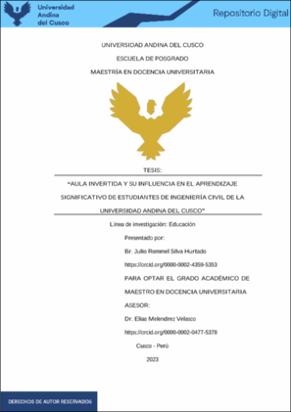| dc.contributor.advisor | Melendrez Velasco, Elías | |
| dc.contributor.author | Silva Hurtado, Julio Rommel | |
| dc.date.accessioned | 2023-12-29T21:20:52Z | |
| dc.date.available | 2023-12-29T21:20:52Z | |
| dc.date.issued | 2023-10-24 | |
| dc.identifier.uri | https://hdl.handle.net/20.500.12557/6024 | |
| dc.description.abstract | Nuestro sistema de educación superior se caracteriza por la aplicación de la
metodología tradicional, impartiendo el conocimiento en el campus, con un modelo
de actividades secuencial: enseñanza, estudio y evaluación. El objetivo del presente
estudio es explicar la influencia de la metodología de enseñanza conocida como
"Aula Invertida" en el aprendizaje significativo de los estudiantes de la Escuela
Profesional de Ingeniería Civil de la Universidad Andina del Cusco. Se procedió
con la implementación del enfoque Aula Invertida en un grupo de estudiantes, el
cual será nuestro grupo experimental, mientras que otro grupo continuó con la
metodología tradicional, siendo nuestro grupo de control. Se realizó la recolección
de datos mediante encuestas y prueba de observación antes y después de la
implementación de las metodologías, se continuó con el análisis estadístico, y
finalmente se evaluó si hubo diferencias significativas. De los descubrimientos
obtenidos principalmente se puede resaltar que, en cuanto al aprendizaje
significativo, los estudiantes del grupo experimental alcanzaron logro destacado en
un 75.6%, en comparación con el 20.5% del grupo control. Como conclusión, se
determinó que implementar el enfoque de enseñanza “Aula Invertida” puede ser
una estrategia efectiva para promover el aprendizaje significativo en los estudiantes.
Este enfoque pedagógico fomenta la participación activa y la comprensión profunda
de los contenidos (saber qué, saber hacer y saber ser), lo que puede traducirse en un
mejor rendimiento académico, demostrándose la importancia de considerar la
implementación de modelos innovadores en la enseñanza de la Ingeniería Civil y
otras disciplinas afines. | es_PE |
| dc.description.abstract | Our higher education system is characterized by the application of the traditional
methodology, imparting knowledge on campus, with a sequential activity model:
teaching, study and evaluation. The objective of the present is to explain the
influence of the teaching methodology known as "Inverted Classroom" in the
meaningful learning of the students of the Professional School of Civil Engineering
of the Andean University of Cusco. We proceeded with the implementation of the
Flipped Classroom approach in a group of students, which will be our experimental
group, while another group continued with the traditional methodology, being our
control group. Data collection was carried out through surveys and observation tests
before and after the implementation of the methodologies, the statistical analysis
continued, and finally it was evaluated if there were significant differences. From
the discoveries obtained, it can be highlighted that, in terms of significant learning,
the students of the experimental group achieved outstanding achievement by
75.6%, compared to 20.5% of the control group. In conclusion, it will be extended
that the teaching approach "Flipped Classroom" will be implemented can be an
effective strategy to promote meaningful learning in students. This pedagogical
approach encourages active participation and a deep understanding of the contents
(knowing what, knowing how to do and knowing how to be), which can translate
into better academic performance, demonstrating the importance of considering the
implementation of innovative models in the teaching of Civil Engineering and other
related disciplines. | en_US |
| dc.format | application/pdf | es_PE |
| dc.language.iso | spa | es_PE |
| dc.publisher | Universidad Andina del Cusco | es_PE |
| dc.rights | info:eu-repo/semantics/restrictedAccess | es_PE |
| dc.rights.uri | https://creativecommons.org/licenses/by-nc-nd/4.0/ | es_PE |
| dc.subject | Aula invertida | es_PE |
| dc.subject | Aprendizaje significativo | es_PE |
| dc.subject | Enseñanza innovadora | es_PE |
| dc.title | Aula invertida y su influencia en el aprendizaje significativo de estudiantes de Ingeniería Civil de la Universidad Andina del Cusco | es_PE |
| dc.type | info:eu-repo/semantics/masterThesis | es_PE |
| thesis.degree.name | Maestro en Docencia Universitaria | es_PE |
| thesis.degree.grantor | Universidad Andina del Cusco. Escuela de Pos Grado | es_PE |
| thesis.degree.discipline | Docencia Universitaria | es_PE |
| dc.publisher.country | PE | es_PE |
| dc.subject.ocde | https://purl.org/pe-repo/ocde/ford#5.03.00 | es_PE |
| renati.advisor.dni | 23863492 | |
| renati.advisor.orcid | https://orcid.org/0000-0002-0477-5378 | es_PE |
| renati.author.dni | 47774896 | |
| renati.discipline | 131067 | es_PE |
| renati.juror | Aguirre Espinoza, Edwards Jesús | |
| renati.juror | Aco Corrales, Eder Arturo | |
| renati.juror | Gil Rodríguez, Carmen Cecilia | |
| renati.juror | Alvarez Espinoza, Jorge | |
| renati.level | https://purl.org/pe-repo/renati/level#maestro | es_PE |
| renati.type | https://purl.org/pe-repo/renati/type#tesis | es_PE |





